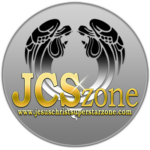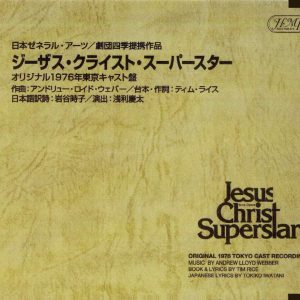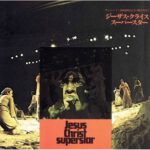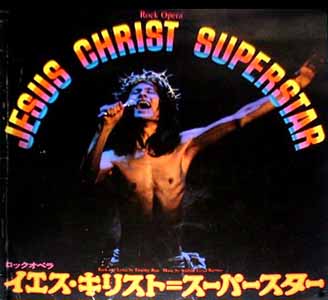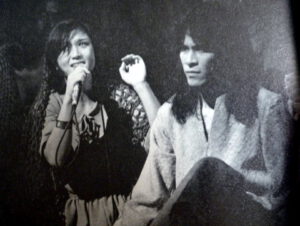Artwork
Explore
You can listen to a sampling of tracks (above) from this recording thanks to our friends at WFMU, “the radio station that bites back.” (And if you like this taste of the chocolate, WFMU is also happy to give you a tour of the whole factory, metaphorically speaking.)
Cast
Jesus of Nazareth…………Takeshi Kaga
Judas Iscariot…………Minoru Terada
Mary Magdalene…………Hideko Kuno
Pontius Pilate…………Tadahiko Hirano
King Herod…………Masachika Ichimura
Simon Zealotes…………Jun Sawaki
Caiaphas…………Hiroshi Mizushima
Annas…………Koji Hishiya
Peter…………Sakae Takita
Priests…………Akihiko Mitsueda, Kazuhisa Seshimo, Akio Yoshiya
Maid by the Fire…………Kazuyo Mita
Soldier…………Hajime Izeki
Old Man…………Goro Matsumiya
The Chorus…………Shiki Theatrical Company
Orchestra
(Electric & Acoustic) Guitars: Masaru Yajima
Electric Bass: Isao Eto
Keyboards: Ken-Ichi Haneda (Maki Yoshinara)
Drums: Kiyoshi Tanaka
Audio Production Information
Produced by Morihisha Shibuya
Engineer: Tomoaki Mori
Translation by Tokiko Iwatani
Arrangements by Takashi Miki
Musical Direction by Morihisha Shibuya
Cover Design by Kaoru Kanamori
Recorded at Toshiba-EMI Studio, Tokyo, January-February 1976
Track Listing
Act 1:
Overture
Heaven On Their Minds
What’s The Buzz
Everything’s Alright
This Jesus Must Die
Hosanna
Simon Zealotes / Poor Jerusalem
Pilate’s Dream
The Temple
Everything’s Alright (Reprise) / I Don’t Know How To Love Him
Damned For All Time / Blood Money
Act 2:
The Last Supper
Gethsemane
The Arrest
Peter’s Denial
Pilate And Christ
King Herod’s Song
Could We Start Again Please?
Judas’ Death
Trial Before Pilate
Superstar
Crucifixion
John 19:41
Historical Notes from a Fan
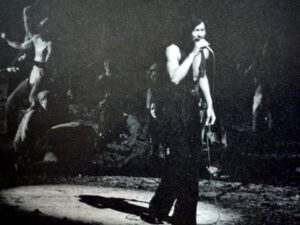
Jesus Christ Superstar continued its march onward into the mid-Seventies, going from strength to strength and enjoying much success around the world. The Japanese premiere came at the hands of the Shiki Theatrical Company, one of Japan’s best-known and largest producers, with support from the Japan General Arts Corporation. Shiki were no strangers to a Western repertoire, having staged straight dramatic classics by the likes of Anouilh and Giraudoux, but in the late Seventies, they began branching into modern musicals, JCS being one example, directed by the company’s co-founder Keita Asari (they would go on to present most of the major Western transfers, including Webber’s Evita, Cats, and Phantom, as well as such hits as A Chorus Line, Mamma Mia!, and West Side Story).
This recording of the original Japanese cast (which includes as Jesus none other than Chairman Kaga, from the Japanese version of Iron Chef; he was critically acclaimed in the role, and played it for four seasons) is perhaps one of the more unusual renditions. Where European productions offer a “standard” approach, the Japanese give us something rather more… expressive. Synthesizers rear their head (albeit less dramatically than in the Spanish rendition), some of the numbers are performed at a faster tempo, which lends more dynamics and tension in the right places, and the attention to detail is nothing short of amazing: the sound is clean, smooth, lacking in the muddiness of other JCS recordings from this era, and the accompaniment, rather than drowning out its performers, supports the vocals nicely.
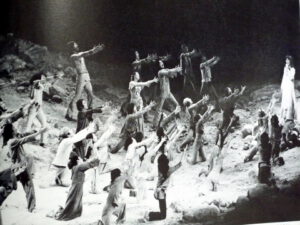
Would that the vocals were slightly better; the Pilate is lame, the Judas sounds like he’s actually trying to commit suicide in his death scene, and the rest of the cast sound fairly generic. Still, the recording is well worth the listen as a part of JCS history; much like the California Youth Theatre recording heralded the beginning of a bright future for JCS productions in the U.S., the Shiki Theatrical Company went on to bring JCS to new heights worldwide.
After the initial premiere in a more traditional rendition (later dubbed the “Jerusalem Version”), in the late Eighties, Shiki premiered the “Japonesque Version,” a production in the style of traditional Japanese Kabuki theater. Jesus wore whiteface with dyed-blonde hair and a vaguely hippie-style net shirt, electric guitars were augmented by Asian rhythm instruments, and on a stark, angled stage loaded down with daihachi guruma (traditional wooden Japanese wagons), geishas met apostles, parasols crossed paths with crosses, and gentle Japanese strings mixed with honky-tonk piano. When Jesus was arrested, the soldiers who took him away were dressed as ancient Japanese warriors. King Herod made his entrance as a transvestite in a luxurious kimono with a rickshaw waiting behind him, twirling a fan. At the foot of the cross, the white-faced mob below formed a cross-hatch pattern with bamboo rods, creating a striking symbolic image of dozens of crosses formed in the wake of Christ’s death. True, there were some concessions to JCS’ style that left Kabuki conventions in the dust: female performers were included, and while the daihachi guruma that were repositioned for each new scene were not traditional Kabuki set pieces, they did create a sense of the Japanese setting.
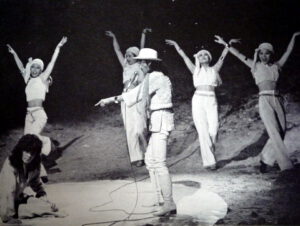
But this was in keeping with the nature of the show. To quote Asari, who directed this version as well, he was particularly interested in re-adapting JCS to a Kabuki approach “because Christianity is the essence of Western culture” and he wanted to “create a fusion and collision of East and West.” Soon this fusion and collision would become literal. In August 1991, Andrew Lloyd Webber would bring this production and its cast to the West End for a successful one-week run at the Dominion Theatre during the Japan Festival in London, saying, “It is the best production of Jesus Christ Superstar I’ve ever seen. It’s what we should have opened with in America 20 years ago. And I mean that.” (It wouldn’t be the last time he said this about a JCS production he was particularly enthusiastic about, but that’s a story that will come into play frequently later in this discography.)
But long before that came the original Tokyo run. With this recording, we can see… well, hear… “what had happened, how it all began,” to quote “Pilate’s Dream.”
Reviews
I Love It
So Jesus Christ Superstar is one of my favourites and I had to hear it in Japanese and I love how it sounded compared to the 70;s version in English. It sounded much better, much more rock than the English one. There is a 2000’s remake in English that I love MUCH more than the 70s English. This Japanese disc sounds like the father of the 2000’s remake in English comparing sounds. The 2000s english remake is more rocky than the Japanese one of course but like I said, it’s like the 76 version in Japanese is the “father” of the 2000’s one. This was well worth the $150 I paid for. Yes. VERY pricey, But I slept on it for a week and decided that I HAD to buy it. I wouldn’t see it again. And I had been looking for a decade.
